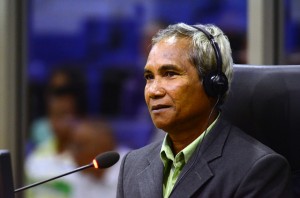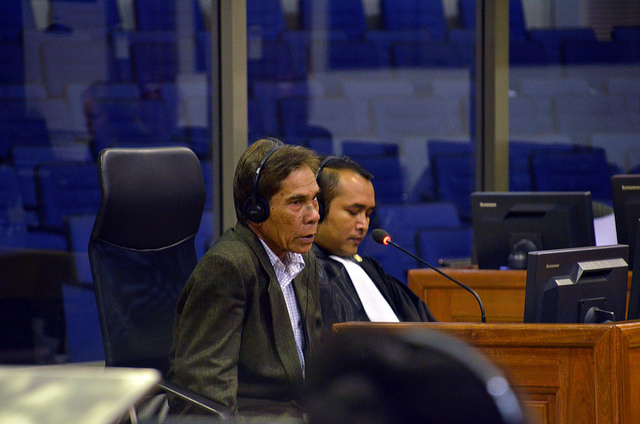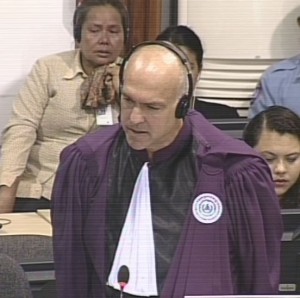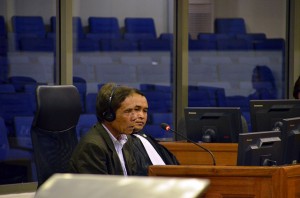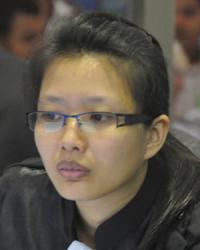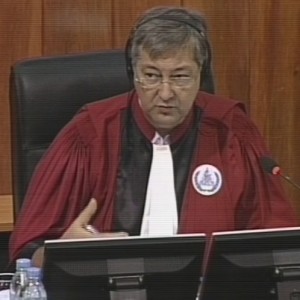“Did you lie to those [DC-CAM] interviewers?” Prosecutor to Witness on Trapeang Thma Dam
Today, on August 13, 2015, the court finished the cross-examination of Mr. LAT Suoy and started the examination of witness Mr. CHHIT Yoeuk, both on the Trapeang Thma Dam (TT Dam) Worksite. (It is also your humble correspondent’s last day as he is going back to complete his degree. Starting Monday, a new writer will accompany you on this journey).
For a short summary of the crimes which are alleged to have been committed by the defendants at the TT Dam worksite—crimes against humanity including enslavement, executions, and forced marriages—read the beginning of the July 27th post here.
__
To start off the day, the floor was handed back to the defense team for Khieu Samphan, in the hands of Anta Guissé and Kong Sam Onn. (You can find yesterday’s post on the examination and cross-examination of Mr. Suoy here.)
To Ms. Guissé, Mr. Suoy spoke about a meeting where Ta Val announced that everyone was going to become captains. Suoy said that it was a confidential meeting and no one was supposed to know about it.
Mr. Onn tried to confirm how old Mr. Suoy was. He pointed to the fact that in his DC-CAM interview done in 2011, Suoy had also said that he was 55 years old. Mr. Suoy responded that he had stopped counting his age so he is still 55 years old. Suoy insisted that his mother had told him he was 15 years old in 1975. At first, Suoy did not recall what animal was associated with his birth year, but he then said it was the year of the Dog. That coincides with what is noted in his OCIJ, the prosecutor pointed out, which is 1958 and that would make him 16 years old on the 17 of April of 1975.
Suoy told Onn that he had only seen the 10 riel note and not the 20 riel notes. He said he had only been told about them as it was said that they were going to get a salary of 20 riels.
When Khieu Samphan’s defense rests, Koppe requests that the Bench admit into evidence the color notes that he showed the witness yesterday and distributed to all parties. He says he is making an oral 87(4) request to admit new evidence. (This post from August 10 has the full text of Internal Rule of Evidence 87(4) as a footnote.) After lunch, the Chamber grants Koppe’s motion but notes that if parties want to use new evidence, they have to submit a request in advance and not at the last minute.
Koppe also the prosecution to share with the defense the documents that they mentioned in Court yesterday pertaining to Ta Val. Koppe says he has not been able to find Ta Val’s confession or the list where Ta Val is mentioned as having been admitted to S-21. The prosecution says it had been waiting to find the original Khmer of the list but will happily share the scans before he puts all three documents (the confession, the list, and its translation) into the case file.
___
Mr. CHHIT Yoeuk, the new witness on the TT Dam was ushered into the courtroom.
Mr. Yoeuk was born on May 1st, 1946. He is currently a rice farmer and a security guard. His wife’s name is Vong Vy and he has three children with her. His father’s name is Cheam and his mother’s name is Veun.
He says he was interviewed twice, once at his house and one at an organization ( he seems to be referring to DC-CAM).
The presiding judge, Mr. YA Sokhan, gives the floor to Mr. Nicholas Koumjian, International Co-Prosecutor. He announced that the combined time for the prosecution and civil party lawyers is three session.
Koumjian starts by confirming Mr. Yoeuk’s level of of education. He says he studied until grade seven of the old system which would mean he received six years of schooling. He says he was a teacher in a refugee camp but it is not clear when. He says he was a monk for three years but it is not clear whether it was during the Lon Nol regime or during the 1960’s, despite Mr. PICH Ang’s attempt at clarification. Ang is the National Civil Party Lead Co-Lawyer.
Yoeuk says that during the Pol Pot regime, “we could not practice Buddhism at all. All the monks were disrobed.”
Yoeuk testifies that the Khmer Rouge entered his village on and off since 1970 and finally captured it in 1973. That same year, Yoeuk says, he joined the Khmer Rouge as a merchant to-and-fro the Lon Nol Regime and the Khmer Rouge controlled areas and as a militia man for them. He says he was the commander of a male militia group who was in charge of transportation and with monitoring the activities of people who might be troublesome.
Mr. Yoeuk’s parents were evacuated by the Khmer Rouge into the jungle in late 1973. Yoeuk does not know why they were evacuated with every single person in their village.
In 1975 he was assigned to be part of the militia, then he was assigned the district office at the Preah Netr Preah. Yoeuk says he was no longer a commander.
Yoeuk says that the chief of the district office at Preah Netr Preah, Leun (phonetic) had worked with Khieu Samphan but cannot confirm this as it was someone else who told him.
Yoeuk says he distributed supplies at the district office. He confirms that a census was created so food could be distributed. The census only consisted of the total number of people not their names.
Later on he became the head of a youth mobile brigade. Yoeuk says he commanded around 600 to 1,000 people. The age range was from 13 years-old to around 27 or 28 years old.
After that he was transferred to a sector level brigade where he was the deputy chief of around 5,000 to 6,000 people, according to the DC-CAM interview which Koumjian mentioned in Court. (It is available here!).
Koumjian reads from a document, to which Onn objects but it is overruled, that Yoeuk’s village, Prey Netr Preah was “the worst place of starvation, where around twenty-thousand people died.”
Yoeuk says that “In that year of course people died. Some died at the site as for the number I did not know the number. “
Trapeang Thma Dam
Yoeuk confirms that he was sent to work at the Trapeang Thma Dam (TT Dam) in April or May, maybe in 1976. When he arrived, he says, people were already constructing the TT Dam. Yoeuk says he worked there from May to December either in 1977 or 1978, although he confirms to Koumjian that he worked for more than a year.
Yoeuk also confirms that there was insufficient water for workers at the TT Dam. He says there were supply trucks that carried water to them.
Assistant to Ta Val
At the Dam, Yoeuk says he was an assistant to chief Ta Val for about four months. He says there were around 8,000 workers under Ta Val. Then he was reassigned to carry fertilizer. He does not know why he was reassigned. He thinks that someone made an accusation against him, but he does not know what mistake he made. Ta Val was the one who reassigned. He did not dare to question or refuse his instructions. “I was already fearful when I was being reassigned, so how could I refuse?” Yoeuk says. “I was afraid of being arrested and sent away to be killed.”
He says he “might have heard” about people being killed but he did not witness it. “At that time we whispered about this worker or this other worker disappearing for no reason,” he says.
Meeting at Svay
Yoeuk says that Ta Val spoke about the overall plan of the Dam construction and the timeline for construction.
Yoeuk confirms that he knew about two meetings one in Svay and another at the TT Dam (perhaps in December 1976 or January 1977), which members from the Central Party had attended. District committee chiefs, zone chiefs, and region chiefs also attended. Later the instructions for constructing the Dam were disseminated.
When Yoeuk said that he was not told that members from the Central party had attended, Mr. Koumjian read from his DC-CAM statement where he had said that members from the Central party had attended and then asked him:
“Did you lie to those interviewers?”
“No, that is how they told us [that central party members had attended] but I did not know the names of those people,” Yoeuk responded.
Yoeuk says he did not disclose the fact that he had studied, that he was a teacher or that he was a monk, when he wrote his biography. He said they asked people in his village, but they did not tell them anything “as they did not know my level of education.”
Yoeuk says that he only stopped carrying fertilizer –-he did that task for five months– when Ta Val was arrested in perhaps late 1977. He does not recall who arrested him or where they took him.
Distributing Rice
After Ta Val’s arrest, he was assigned to distribute rice. Heng, also from the NW Zone, replaced Ta Val, he says.
Yoeuk says there were 20,000 people at the worksite, and he was in charge of distributing rice to all 20,000 of them. He says he was in charge of taking the rice from the cooperative that were growing rice, put it in a warehouse and “distribute it back out again.”
In his past statements, Koumjian points out, he had said he distributed rice to 32,000 workers. Yoeuk explains that at the planning meeting they had told him that there were going to be more people than 20,000.
Rice was distributed every three days, when they “were on the offensive.” Yoeuk explains that “being on the offensive” meant that they had to do their best to accomplish a goal.
Yoeuk explains that 4 cans of rice equaled one kilo. The cans that were used were the condensed milk cans. One bag of 400 cans, as they were stored, weighed 100 kilograms, Yoeuk confirms.
The secretary of District Five, the chief, was Rin who came from the South West zone. Yoeuk does not know which village Rin was from as “it was not easy to ask personal details during that time.”
Yoeuk says that right before Rin, Ta Chil, the son of Ruos Nhim, was the provisional chief.
Khieu Samphan’s statement about Dams
Koumjian finishes his examination by reading an excerpt that was written by Khieu Samphan, and paraphrased here:
“Maybe it was naïve for me to become obsessed with the dams and dykes that signified the modern Cambodia I dreamed about. Maybe it was naiveté which finally brought me to trust Pol Pot, and to sequester myself in the headquarters where I was oblivious to the fact that his ultra-radical policies and brutal methods where bleeding the nation dry and making it weak against Vietnam.”
“Did you observe these radical policies and brutal methods?” asked Koumjian.
Yoeuk responded: “I was at a very low level, I did not pay any attention to that. I was only trying to survive.”
__
Ms. TY Srinna, Civil Party Co-Lawyer, then took the floor.
Yoeuk tell Ms. Srinna that he was monitored or supervised when he had to carry the fertilizer. When he was one of the six or seven assistants to Ta Val, it is not clear whether he was monitored or not. He says his role was “to motivate those youths to work harder. I reinforced the daily quota. Then I went and reported to Ta Val that a certain group had completed the quota.” Tasks were delegated to him by the committee that was chaired by Ta Val.
Yoeuk said the some had to work even at night at the beginning. Night work started at 7 p.m. in the evening. Yoeuk said that it was his personal understanding that they had to work at night because there was a plan to complete the dam within a certain timeframe.
Yoeuk said that the plan originated at the sector level and higher up levels. “The instruction was for the upper echelon and Ta Val was the commander in charge of building.”
Yoeuk says there were more evacuees from Phnom Penh (“17 April People”) than “Base People” at the TT Dam.
As for the quota, Yoeuk says that at the beginning the workers could not complete the quota of two cubic meters per day, but “once they got used to it, they could complete it.” He also added that those that did not complete had to keep working, as a sanction or punishment, until they completed it.
Yoeuk says he never saw anyone die at the worksite.
Yoeuk also confirmed that there were children at the worksite and he knows this because they received a smaller food rations than adults. He says that there were many children aged 11 to 16.
Ms. Srinna asks Yoeuk whether he has heard of the “slogan that females had to be killed at the sluice gates so that the dam would hold firmly?” Yoeuk says he has not heard of that slogan.
Koppe asks where that slogan comes from. Srinna responds it is from the closing order.
Srinna asks Yoeuk if people were killed and dropped into the dam. Kong Sam Onn, interrupts to ask to give the reference. Srinna says it is paragraph 349. Yoeuk says he did not hear or witness this. He says he witnessed some deaths but not in the manner that she mentions. “It may have happened but I was not told,” he said.
Srinna does not ask him about the deaths and moves on to ask about the physical condition of all workers but Koppe objects as it is too broad. Srinna rephrases to ask Yoeuk about the workers that he actually saw at the worksite.
Yoeuk confirms that workers were emaciated. They usually become emaciated during the rainy season as the food ration was reduced and they did not sleep well at night. He says that around half of the workers were emaciated.
Judge Lavergne
Srinna rests and Judge Lavergne asks a couple questions (apparently skipping over Ms. Marie Guiraud’s time).
To Judge Lavergne, Yoeuk says that he was instructed to monitor the activities of people after the 17 of April of 1975 because some people might not agree with the regime’s policies. He explains that they monitored people without eavesdropping. They watched to see if anyone wanted to engage in any rebellious activity. “Anyone who opposed the regime, would be reported to the regime,” he said.
Yoeuk tells Judge Lavergne he had no idea about the policy towards the Vietnamese as he never attended any meetings because he was a low-level cadre.
Yoeuk said that only in 1978 did he hear that the only people who could order an execution were people from the Center. Before 1978, Yoeuk says that it might have been that village chiefs might have killed and that prompted the decision in 1978. “We have to think about this together,” he says. In Yoeuk’s own statement, Judge Lavergne says that he said that the instructions from 1978 were not followed as people were killed without reporting it to the center. He says he did not witness it personally but “some people might know about it.”
Yoeuk says that he does not know who was at the Party Center.
When Judge Lavergne asks about a security center that Yoeuk says he distributed rice to, Ms. Guissé is allowed to interrupt and force the judge to explain whether the security center is within the scope of the trial. Judge Lavergne explains that he is just trying to understand what the role of this witness was. Yoeuk says he delivered rice until the Vietnamese arrived and Judge Lavergne ends his questioning.
The court is adjourned and it will resume next Monday August 17, 2015 at 9 a.m. when it will continue hearing the testimony of Mr. Yoeuk.

